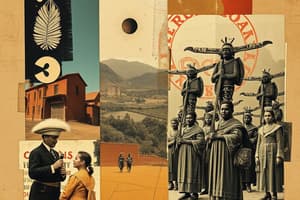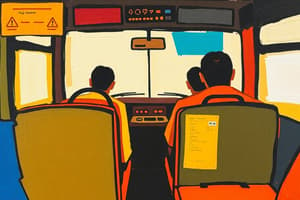Podcast
Questions and Answers
ما هو عدد الأوتار في جيثارة الكلاسيكية Laúd clásico؟
ما هو عدد الأوتار في جيثارة الكلاسيكية Laúd clásico؟
- عشرة أزواج من الأوتار
- ثلاثة أزواج من الأوتار
- ستة أزواج من الأوتار
- ثمانية أزواج من الأوتار (correct)
ما الاختلاف الرئيسي بين جيثارة الكلاسيكية Laúd clásico والفيولا القوسية Vihuela de arco؟
ما الاختلاف الرئيسي بين جيثارة الكلاسيكية Laúd clásico والفيولا القوسية Vihuela de arco؟
- طريقة إنتاج الصوت وعدد الأزواج المزدوجة (correct)
- شكل الجسم وحجم الرقبة
- حجمها وطريقة عزفها
- عدد الأوتار والمظهر الخارجي
ما نوع الأكورديون الذي ينتج الصوت عند ضربه بدلاً من خدشه أو حكه؟
ما نوع الأكورديون الذي ينتج الصوت عند ضربه بدلاً من خدشه أو حكه؟
- Arpa jacobea (correct)
- Bandurria
- Vihuela de arco
- Laúd clásico
كم عدد الأوتار في باندوريا Bandurria؟
كم عدد الأوتار في باندوريا Bandurria؟
ما يميز جيثارة الكلاسيكية Laúd clásico عن فيولا القوسية Vihuela de arco؟
ما يميز جيثارة الكلاسيكية Laúd clásico عن فيولا القوسية Vihuela de arco؟
من بين هذه، ما هي المميزات التي تنفرد بها فيولا القوسية Vihuela de arco؟
من بين هذه، ما هي المميزات التي تنفرد بها فيولا القوسية Vihuela de arco؟
ما الذي يميز نظام الضبط الفريد للأكورديون؟
ما الذي يميز نظام الضبط الفريد للأكورديون؟
من بين الفنانين التالية، من كان يعتبر عازفًا متميزًا للغيتار كاتالونيًا؟
من بين الفنانين التالية، من كان يعتبر عازفًا متميزًا للغيتار كاتالونيًا؟
ما الذي قام به أندرس سيغوفيا لتعزيز سمعة الجيتار والأكورديون؟
ما الذي قام به أندرس سيغوفيا لتعزيز سمعة الجيتار والأكورديون؟
من هو دعامة حديثة لفن عزف الأكورديون؟
من هو دعامة حديثة لفن عزف الأكورديون؟
ما هو التقنية المحددة التي تحتاج إليها أداء أكورديون؟
ما هو التقنية المحددة التي تحتاج إليها أداء أكورديون؟
أحدهم لم يشير بشكل خاص إلى الأكورديون في عزفه، فمن هو؟
أحدهم لم يشير بشكل خاص إلى الأكورديون في عزفه، فمن هو؟
Study Notes
Introduction
The Cordoban lute, often referred to simply as the cordobán, is a traditional Spanish instrument that has played a significant role in the history of music. This stringed instrument is known for its distinct sound and unique construction, which sets it apart from other instruments. In this comprehensive guide, we will delve into the various types of cordobanes, prominent artists who have performed on them, and the techniques used to create their distinctive sounds.
Types of Cordoban Lutes
There are several variations of the cordobán, each with its own characteristics and playing styles. These include:
Vihuela de arco
This type of cordobán is characterized by its small size and high pitch, making it suitable for solo performances. It features six double strings, allowing for more dynamic and expressive playing compared to its larger counterparts.
Laúd clásico
The classical laud is a slightly larger version of the vihuela, featuring eight single strings and a deeper, richer sound. Its broader neck allows for easier finger positioning, enabling players to perform complex melodies and chord progressions.
Arpa jacobea
Also known as the Jacob's harp, this cordobán variant consists of a wooden frame with metal wires stretched across it. Unlike other cordobáns, the arpa jacobea produces sound when struck rather than plucked or strummed.
Bandurria
A bandurria is a cordobán with ten double strings, creating a bright, full tone. Its unique tuning system allows for the performance of intricate harmonies and polyphonic arrangements.
Notable Cordoban Luthiers and Performers
Throughout history, many skilled craftsmen and musicians have contributed to the development and popularity of the cordobán. Some of the most notable figures include:
Francisco Tárrega
Francisco Tárrega (1852–1909) was a renowned guitarist and composer whose work helped popularize the classical guitar. Although he did not play the cordobán specifically, his influence extended to all stringed instruments, including the cordobán.
Miguel Llobet
Miguel Llobet (1878-1938) was a Catalan virtuoso guitarist who focused primarily on the music of Spanish composers such as Isaac Albéniz, Enrique Granados, and Joaquín Turina. His repertoire included numerous works originally composed for the violin, which he adapted for the guitar and later the cordobán.
Andrés Segovia
Andrés Segovia (1893–1987) was another influential figure in the world of classical guitar and cordobán music. He sought to expand the repertoire beyond folk music and promote it as a serious concert instrument. Segovia also commissioned contemporary compositions, further enhancing the prestige of both the guitar and the cordobán.
Pedro Estevan
Pedro Estevan is a modern-day exponent of cordobán music, having dedicated himself to its preservation and promotion after discovering the instrument in the early 20th century. He has created new pieces for the cordobán and continues to inspire musicians around the world to explore its potential.
Techniques for Playing Cordobans
While cordobáns share similarities with other stringed instruments, they require specific techniques to achieve their characteristic sound. Some of these methods include:
Tremolo
Tremolo refers to rapidly alternating between two notes, which can be achieved using a special technique called "tapado." This method involves pressing down twice before lifting one finger to produce a vibrato effect, giving the impression of a fast tremolo without actually executing rapid alternate strokes.
Harmonization
Playing harmonized versions of melodic lines is common in cordobán music, particularly when performing polyphonic arrangements. This requires careful attention to fingering, intonation, and timing to ensure accurate execution.
Strumming Patterns
Strumming patterns vary depending on the piece being played, with some requiring fast, rhythmic strums while others call for slower, more delicate strokes. Mastering different strumming techniques is essential for showcasing the versatility of the cordobán.
In conclusion, the cordobán is a fascinating musical instrument with a rich history and unique characteristics. By understanding the various types, exploring the contributions of legendary performers and luthiers, and learning essential playing techniques, we gain a deeper appreciation for this captivating instrument and its place within the world of Western classical music.
Studying That Suits You
Use AI to generate personalized quizzes and flashcards to suit your learning preferences.
Description
Explore the world of Cordoban lutes, a traditional Spanish instrument with a rich history in music. Learn about the different types of cordobanes, renowned artists and luthiers associated with it, and essential playing techniques for this unique stringed instrument.




